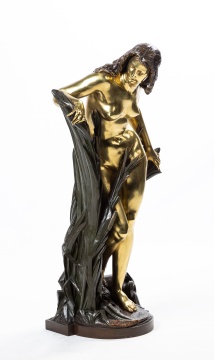Albert Carrier-Belleuse (French, 1824-1887) Nymph in the Reeds


Hammer Price w/ BP
$1,200
| Lot #: 103 Albert Carrier-Belleuse (French, 1824-1887) Nymph in the Reeds |
|
Two-toned patinaed bronze. Signed 'A. Carrier' at base. |
| Ht. 30 in. |
|
Provenance A New York Estate. |
|
Auction Date Mar 20, 2024 |
Details:
Albert Carrier-Belleuse (French, 1824-1887)
Albert Carrier-Belleuse was a French sculptor. He was one of the most important and innovative sculptors of 19th century France. Dr. Anita Brookner called him a ‘manipulator of styles’, an epithet addressing Carrier-Belleuse's versatility and fearless experimentation in the fine and decorative arts. Carrier-Belleuse is the name used by this sculptor - born Carrier de Belleuse - on his mature pieces, after initially signing works "A. Carrier." Carrier-Belleuse was an established internationally as a high-art sculptor.
He produced abundantly for a variety of international patrons in most categories of three-dimensional work - public monuments, for example, Masséna (1867, Nice), allegorical reliefs for Parisian buildings (Palais des Tuileries and Banque de France, 1865-1866), tombs for foreign heroes (San Martín Cathedral, Buenos Aires, Argentina), and classicizing figure subjects such as Sleeping Hebe for the Salon (1869, marble; Musée d'Orsay, Paris) - while simultaneously maintaining high visibility in the applied arts. Carrier-Belleuse made many terra cotta pieces, the most famous of which may be The Abduction of Hippodameia depicting the Greek mythological scene of a centaur kidnapping Hippodameia on her wedding day.
Albert Carrier-Belleuse was a French sculptor. He was one of the most important and innovative sculptors of 19th century France. Dr. Anita Brookner called him a ‘manipulator of styles’, an epithet addressing Carrier-Belleuse's versatility and fearless experimentation in the fine and decorative arts. Carrier-Belleuse is the name used by this sculptor - born Carrier de Belleuse - on his mature pieces, after initially signing works "A. Carrier." Carrier-Belleuse was an established internationally as a high-art sculptor.
He produced abundantly for a variety of international patrons in most categories of three-dimensional work - public monuments, for example, Masséna (1867, Nice), allegorical reliefs for Parisian buildings (Palais des Tuileries and Banque de France, 1865-1866), tombs for foreign heroes (San Martín Cathedral, Buenos Aires, Argentina), and classicizing figure subjects such as Sleeping Hebe for the Salon (1869, marble; Musée d'Orsay, Paris) - while simultaneously maintaining high visibility in the applied arts. Carrier-Belleuse made many terra cotta pieces, the most famous of which may be The Abduction of Hippodameia depicting the Greek mythological scene of a centaur kidnapping Hippodameia on her wedding day.
Shipping Information:
Unlike many auction companies, Cottone Auctions offers a full-service shipping department. We’re equipped to pack and safely ship just about any item to just about any location around the globe.
Learn more >


